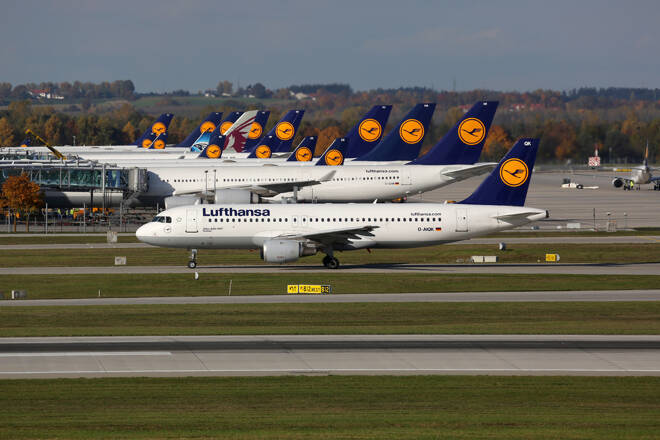Advertisement
Advertisement
Lufthansa Don’t Expect Air Travel Demand to Return to Pre-COVID-19 levels Before 2024; Sell With Target Price EUR 5
By:
Lufthansa, the largest German airline company, said they do not forecast a return of air travel demand to pre-COVID-19 levels at least before 2024 after the company posted a quarterly operating loss of 1.7 billion euros in the second quarter despite significant cost reductions, sending its shares down about 2%.
Lufthansa, the largest German airline company, said they do not forecast a return of air travel demand to pre-COVID-19 levels at least before 2024 after the company posted a quarterly operating loss of 1.7 billion euros in the second quarter despite significant cost reductions, sending its shares down about 2%.
The second-largest airline in Europe in terms of passengers carried said the collapse in demand for air travel due to the COVID-19 pandemic led to an 80% decline in revenue for the Lufthansa Group in the second quarter to 1.9 billion euros, from 9.6 billion euros a year earlier.
In the second quarter of this year, the German airline carried 1.7 million passengers, 96% fewer than in the previous year. Capacity fell by 95%.
Lufthansa’s posted a quarterly operating loss of 1.7 billion euros in the second quarter, worse than last year’s profit of 754 million euros, despite extensive cost reductions. Operating expenses were reduced by 59%, primarily through the introduction of short-time working for large parts of the workforce and the cancellation of non-essential expenditures.
At the time of writing, Lufthansa’s shares traded about 2% lower at 8.05 euros, still down over 50% so far this year.
Executive comments
“We are experiencing a caesura in global air traffic. We do not expect demand to return to pre-crisis levels before 2024. Especially for long-haul routes, there will be no quick recovery. We were able to counteract the effects of the coronavirus pandemic in the first half of the year with strict cost management as well as with the revenues from Lufthansa Technik and Lufthansa Cargo. And we are benefitting from the first signs of recovery on tourist routes, especially with our leisure travel offers of the Eurowings and Edelweiss brands. Nevertheless, we will not be spared a far-reaching restructuring of our business,” Carsten Spohr, Chairman of the Executive Board and CEO of Deutsche Lufthansa AG, said in a press release.
“We are convinced that the entire aviation industry must adapt to a new normal. The pandemic offers our industry a unique opportunity to recalibrate: to question the status quo and, instead of striving for “growth at any price”, to create value in a sustainable and responsible way.”
Lufthansa stock forecast
Morgan Stanley target price is 5 euros with a high of 14 euros under a bull scenario and zero under the worst-case scenario. Sanford C. Bernstein set a 10 euros price objective on Deutsche Lufthansa. The brokerage currently has a neutral rating on the stock.
Several other equity analysts have also updated their stock outlook. HSBC set a 5 euros price objective on Deutsche Lufthansa and gave the stock a sell rating. Oddo Bhf set a 9.50 euros price objective and gave the stock a sell rating. UBS Group set a 5.85 euros price objective and gave the stock a sell rating.
We think it is good to sell at the current level and target at least 5 euros in the short-term as 100-day Moving Average and 100-200-day MACD Oscillator signal a strong selling opportunity.
The one listed on the U.S. stock exchange is expected to rise to $9.45 in 12 months, two analysts forecast, with a high forecast of $9.45 and a low forecast of $9.45. The average price target represents a -2.48% decrease from the last price of $9.69. Both recommended to ‘Sell’.
Analyst comment
“While we think Lufthansa has been quick in reducing costs and extending payment terms with suppliers, we think the loss generated by the Covid-19 pandemic (of c€6bn, on our base case estimates) will be difficult to absorb with free cash flow generation and is not yet fully discounted in the share price,” said Carolina Dores, equity analyst at Morgan Stanley.
“Lufthansa’s large owned fleet and diversified business mix (maintenance, freight and catering business) could give it better flexibility on balance sheet repair and self-help compared to AF-KLM; however, all businesses would be negatively affected by the pandemic and therefore we think much of its balance sheet repair flexibility has been constrained,” the analyst added.
Upside and Downside risks
A stronger recovery of demand once travel bans are lifted; Greater cost-cutting than we have anticipated; Faster market consolidation and, therefore, higher unit pricing environment, Morgan Stanley highlighted as upside risks to Lufthansa.
Failure to secure the German government’s stabilization loan; Higher cost of ramping up operations Delayed turnaround of Eurowings due to stronger competition in the group’s routes, were the major downside risks.
About the Author
Vivek Kumarauthor
Vivek completed his education from the University of Mumbai in Economics and possesses stronghold in writing on stocks, commodities, foreign exchange, and bonds.
Advertisement
